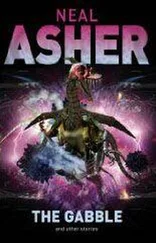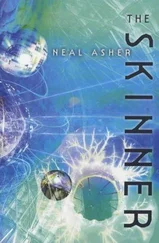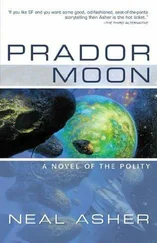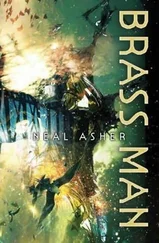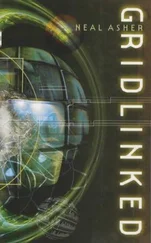Neal Asher - The Departure
Здесь есть возможность читать онлайн «Neal Asher - The Departure» весь текст электронной книги совершенно бесплатно (целиком полную версию без сокращений). В некоторых случаях можно слушать аудио, скачать через торрент в формате fb2 и присутствует краткое содержание. Жанр: Старинная литература, на английском языке. Описание произведения, (предисловие) а так же отзывы посетителей доступны на портале библиотеки ЛибКат.
- Название:The Departure
- Автор:
- Жанр:
- Год:неизвестен
- ISBN:нет данных
- Рейтинг книги:4 / 5. Голосов: 1
-
Избранное:Добавить в избранное
- Отзывы:
-
Ваша оценка:
- 80
- 1
- 2
- 3
- 4
- 5
The Departure: краткое содержание, описание и аннотация
Предлагаем к чтению аннотацию, описание, краткое содержание или предисловие (зависит от того, что написал сам автор книги «The Departure»). Если вы не нашли необходимую информацию о книге — напишите в комментариях, мы постараемся отыскать её.
The Departure — читать онлайн бесплатно полную книгу (весь текст) целиком
Ниже представлен текст книги, разбитый по страницам. Система сохранения места последней прочитанной страницы, позволяет с удобством читать онлайн бесплатно книгу «The Departure», без необходимости каждый раз заново искать на чём Вы остановились. Поставьте закладку, и сможете в любой момент перейти на страницу, на которой закончили чтение.
Интервал:
Закладка:
‘She’ll be listed in a protected-asset file.’
‘Which makes the search even more dangerous and difficult.’
After a moment, he shrugged the problem away. ‘Keep looking whenever you have the processing space available.’ He was aware he felt strong emotion about his sister, but pursuing his present course now seemed more important. In fact he had the odd feeling that by sticking to this course, the matter of his sister would be resolved, and that it was inclusive – yet that made no sense at all.
‘They could easily have forced me to tell them what I did,’ he said to Hannah.
‘They searched your files but couldn’t find very much, because you kept most of what you achieved inside your head. They’d already tried the viral nanite on a political prisoner, and it killed him quicker than cyanide.’ She added, ‘You got away with a lot simply because your mother was high up in the Committee Executive.’
‘What about my father?’
‘Dead by then.’
‘What happened next? What finally made them put me in that crate?’
Hannah explained the history.
One of the scientists working in the Dinaric community, a woman who always came under the most intense scrutiny because the political officers knew she disagreed with the whole concept of world government, had created a very powerful form of Hyex laminate which she supplied to the Albanian Separatists. They then blew the periphery fence and got her and five other scientists out, but that effectively spelled the end of the community. The Applied Sciences branch of the Inspectorate Executive now decided it would be better to separate the scientists into small groups, each focusing on one discrete area of the various projects the Committee wanted quickly advanced. One group worked on fusion-drive technology, one on satellite imaging and recognition programs, another on gerontology and yet another on GM bacteria used to clear up pollution, and so forth. Hannah’s particular group had the goal of connecting up the human mind to a computer, whereupon Alan Saul, his focus now straying from nanotech and retrovirals to artificial intelligence, was seconded to her group under the supervision of Political Director Smith.
They did some superb work, finally managing to install a terabyte processor inside a human skull, though never able to connect it up completely to the human brain, only managing to wire it in through the sensory nerves. Saul decided he wanted one of these processors inside his own skull and so, with his usual blinkered focus, he hacked into research-team security when Smith was absent, and falsified the orders . . .
‘I inserted that processor in your head, Alan,’ Hannah now told him. ‘I thought it a stupid risk to take, but I never disobeyed orders. I assumed you had suggested it to Smith and he’d agreed, perhaps after you claimed that by using the technology you might be able to crack the mind–silicon interface.’
Saul had then been concentrating on trying to copy the function of the human mind into software, on silicon, to make it easier to crack that same interface. Smith and his advisers were getting both very worried and very excited about this work, and when Alan used some of his comlife, as he called it, to punch through security so easily, it seemed that their worries were justified.
‘Smith hated you, though I don’t think he could have done anything about that if your mother had still been alive, but she’d died a month before.’ Hannah shook her head. ‘I tried to excuse your behaviour by telling Smith you’d gone a bit strange after your mother’s death, but the truth was that you showed no reaction to that at all. It just didn’t seem to interest you.’
Smith finally cleared permission to take Alan off the project and send him for adjustment. But that came a little too late, because Saul crashed computer security systems and all the research computers before escaping. While in the outside world, he created false community credit, a false identity, and even managed to penetrate secure Committee files to erase all details that might be used to track him down. Alan Saul thus disappeared from most computer systems and most live computer files, except for the discs retained at the Dinaric community. It was the information on a single disc like this that enabled newly developed recognition software to track him down. Enforcers arrested him while he was living in a ministerial apartment in the Caribbean, and handed him directly to Smith for adjustment.
‘He used the hardware inside your head and pain inducers to torture you,’ explained Hannah. ‘He even brought me and the rest of the team in to watch, just so we understood where any disobedience would lead. When he’d finished, you didn’t have a mind left; in fact large parts of your brain suffered lethal bleeds, and tissue had died inside your skull, too. They then dragged you off for disposal, so I don’t know how you can be here now.’
So Smith was his interrogator. Even as Hannah finished speaking, Saul also knew why he hadn’t died. A memory lurked just at the periphery of his mental perception, a ghostly hint of the person he had once been. He realized that to lose his mind was his greatest terror, and Smith, knowing this with the instinct of all sadists, had therefore chosen that way to destroy him. He also realized that he had done something to ensure that both his brain and his mind would prove difficult to totally destroy, perhaps something involving that retroviral and anti-ageing fix. Nevertheless, Smith had come very close to his objective: Saul still possessed a mind, but not the mind of the original Alan Saul.
‘Was I violent?’ he asked.
‘Never,’ she replied. ‘In fact, if you had been capable of real violence, I don’t think they would ever have caught you.’
So that was it. The first Alan Saul had not been sufficiently ruthless, but had ensured that his creation would be.
The British government had established the World War Two bunker in preparation for a Nazi invasion, perhaps to provide just one more safehouse amidst many for dissident forces or a government in hiding, but what remained of its history was unclear. It was Janus who found it for Saul, then carefully erased all reference to it from official computer records, but he needed to ensure that no local knowledge of it existed either. It lay amidst agricultural land, just fifty metres to one side of a road composed of carbocrete blocks along which only robotic harvesters ran. It was a location frequented by very few humans now.
To gain access to the croplands he had to assume yet another identity but, wanting to use the bolt-hole long-term, he did not lift that identity from a corpse. Janus created a new persona for him, and to acquire it he needed to visit an All Health clinic to have the necesssary ID implant injected into his arm, which struck him as even more risky than killing off another bureaucrat. All agricultural land now being private government property, only approved workers were allowed anywhere near it. Any intruder was at risk of being spattered by readerguns mounted on the harvesters or independently mobile and stalking through the crops like iron spiders – in fact, the precursors to modern spiderguns – or in danger of being attacked by razorbirds, with a similarly messy result. He’d already seen the decaying corpses of those who had tried to supplement their rations: their remains got ploughed into the soil after harvest, old bones shattered by the disking that broke up the clods of earth.
Driving his recently requisitioned mini-digger up from the roadway, Saul came to a concrete area enclosed on three sides by block walls, now overgrown with weeds and occupied by rusted-together piles of swarf and machine parts and an ancient truck probably belonging to a scrap dealer from some previous age. He recognized this area as a bay intended for mounding beet before they were transported away – from the time before such vegetables were wrenched from the ground by robotic harvesters, washed and then mashed up, before the mulch was injected straight into one of the many processing plants scattered across the local landscape.
Читать дальшеИнтервал:
Закладка:
Похожие книги на «The Departure»
Представляем Вашему вниманию похожие книги на «The Departure» списком для выбора. Мы отобрали схожую по названию и смыслу литературу в надежде предоставить читателям больше вариантов отыскать новые, интересные, ещё непрочитанные произведения.
Обсуждение, отзывы о книге «The Departure» и просто собственные мнения читателей. Оставьте ваши комментарии, напишите, что Вы думаете о произведении, его смысле или главных героях. Укажите что конкретно понравилось, а что нет, и почему Вы так считаете.


